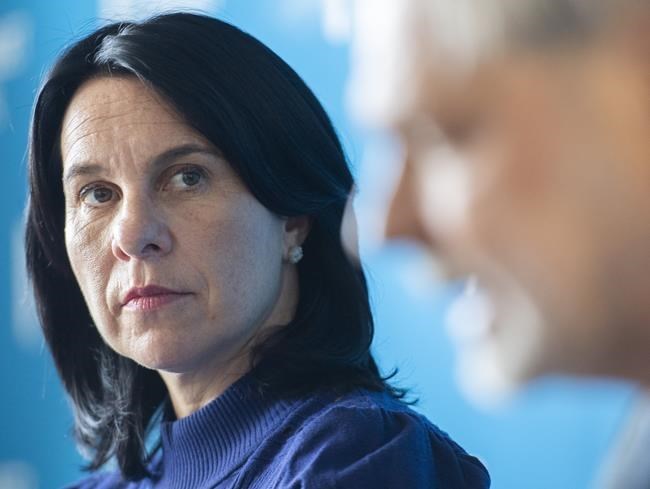MONTREAL — When Soufia Khmarou moved from Morocco to Montreal in 2009, she thought finding an affordable house for her and her three children was going to be easy.
"I was not expecting this," Khmarou said in an interview Monday. "What we see, what we hear about Quebec … the reality doesn't reflect the ad."
Khmarou appeared next to Manon Massé, a spokesperson with Quebec's second opposition party, Québec solidaire, who told reporters Montreal's affordable housing shortage is going to get worse if more money isn't made available.
Standing next to a construction site of high-end condominiums near downtown Montreal, Massé said, "There are housing units being built in Montreal. But for the families that want to find a place to stay and afford to pay rent each month, there's a crisis."
The need for affordable housing will be especially acute after June 30, she said, when most of the leases across the province end. Many families will be forced to remain in or move into homes that are unsanitary or unfit for their needs. Massé said low-income families in Montreal and in the rest of the province are spending up to 85 per cent of their monthly incomes on housing.
Khmarou said she's been on waiting lists to access subsidized housing for the past three years, hoping to move her family out of a Montreal apartment she said is unsanitary.
"But I don't have any answers; all I see is more and more people on the same lists," Khmarou said. "There's no hope; there's no low-rental housing that's being added on the market."
Montreal Mayor Valérie Plante held a separate news conference on Monday, also to lament the lack of affordable housing in the city. Plante said Montreal has been waiting for the past four years for millions of dollars promised by the federal government to build around 1,200 affordable housing units and renovate an additional 4,700 units.
"We know that there's a housing crisis — it's hard on July 1," Plante told reporters. "To know that there are almost 6,000 units that are taken hostage, that aren't made available for citizens, it's unacceptable. It's been four years, at one point, patience has a limit.
"When we talk about the safety and healthiness of housing units, that's what's at stake," she said.
A coalition of housing committees and tenant associations in Quebec released a report over the weekend indicating a widespread rent increase across the province. The coalition analyzed 51,000 rental listings from February to May and said rents across the province increased by nine per cent between 2021 and 2022, reaching an average of $1,300 per month.
The coalition said that less-populated parts of the province were used to an accessible market but are now seeing strong increases.
Rentals.ca, a Canadian website for apartment rental searches, said the average rent for all Canadian properties listed on its site was $1,888 per month in May — a year-over-year rise of 10.5 per cent. With an average of about $2,000 a month for a two-bedroom unit, Montreal ranked 22nd out of 35 cities. Vancouver, the front-runner, had the same size units listed for an average of $3,495 per month.
The association of homebuilders, called the Association des professionnels de la construction et de l’habitation du Québec, said in a report last week that Quebec is missing 100,000 homes, with more than 37,000 families on waiting lists to access subsidized housing.
Paul Cardinal, director of economic services with the association, wrote that "the only way to sustainably reduce real estate overheating is to increase supply."
This report by The Canadian Press was first published on June 27, 2022.
---
This story was produced with the financial assistance of the Meta and Canadian Press News Fellowship.
Virginie Ann, The Canadian Press



